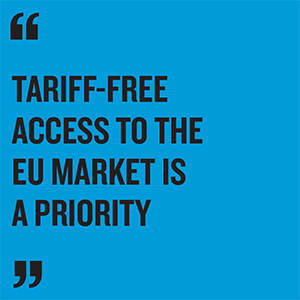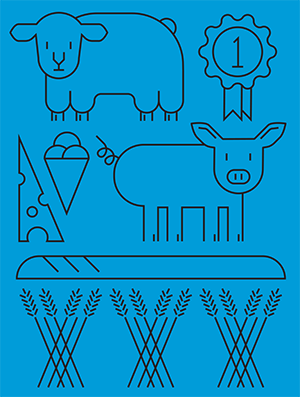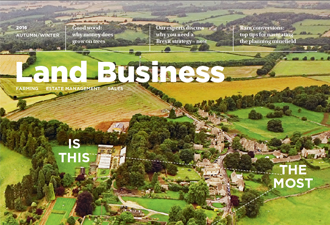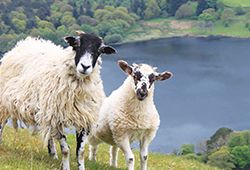

Now that Article 50 has been triggered, what must rural businesses do to gear up for the brave new world of Brexit? We get the views of experts from across the agricultural sector

The fundamentals will remain the same, so focus on good farm management
Will Gemmill, Head of Farming, Strutt & Parker
Many of us, including farming ministers, have moaned about the CAP. We now have the chance to create an agricultural and environmental policy that works for us.
We can only speculate about what this policy might be, but it’s highly unlikely that farmers will receive similar direct payments to now. Perhaps the key question is whether the government will continue to protect farmers or liberalise the sector, which is perceived by many as inefficient. If there are winds of change, will they be a gentle breeze or a hurricane?
Regardless, the fundamentals of running an efficient business remain the same: detailed understanding of your markets, revenues, costs and profits. Farmers’ focus should be on good management. On the ground, aim for excellence in growing the crop, understand the relationship between soils and crops, and monitor, evaluate and learn from the results.
The farming mindset will need to change too: improvement through marginal gains will be key, as will using the best information to find solutions, and ensuring that everyone in the team knows what the objectives are and provides feedback.
Examine your business, secure income and cut costs – don’t sit back and wait
Ross Murray, CLA President
It is hard to underestimate how much our farming industry has been shaped by over 40 years of EU membership. Brexit opens up a world of opportunities for the future of the sector and the rural economy, but most of these are not immediate. The risks of getting Brexit wrong are substantial. Above all else, the industry must play its part in supporting the government to get the best possible free-trade agreement for food and farming.
One area where farmers and landowners will benefit is in the shaping of a worthy successor to the CAP. We can build a new policy better suited to UK needs, focused on clearer objectives that support farmers to be more productive and profitable, as well as delivering public goods with better outcomes for the environment.
I have confidence that our industry will be stronger and better off after Brexit, whenever that might be. But of course, no one should sit back and wait. Landowners have to examine their businesses while seeking out diversification to secure income, and, wherever possible, should invest where necessary to increase the product quality of their farming offer and reduce its cost base. It’s not an easy challenge, but it’s a worthy one.
Use the next three years to take stock of your business
Clare Slipper, Parliamentary Officer, NFU Scotland
For the Scottish farming and food industry, access to the EU market without tariffs or barriers has always been a priority. Next to the rest of the UK, Europe remains the largest destination for Scottish food exports and a market that offers good opportunities for growth.
As Theresa May has ruled out staying in the single market, it is vital that the prime minister achieves her objective of a free-trade agreement with the EU. But these developments also present much bigger questions that will guide discussions with Scottish and UK negotiators over the coming months.
 Will future trade arrangements allow Scottish producers the best possible access to EU markets, perhaps in the form of a ‘special deal’ as has been suggested for other industries? With freedom of movement a sticking point, will we retain access to a competent workforce? Will the negotiations allow the development of an agricultural policy to provide appropriate funding and flexibility in policymaking that recognises Scotland’s unique agricultural systems and drives farm profitability?
Will future trade arrangements allow Scottish producers the best possible access to EU markets, perhaps in the form of a ‘special deal’ as has been suggested for other industries? With freedom of movement a sticking point, will we retain access to a competent workforce? Will the negotiations allow the development of an agricultural policy to provide appropriate funding and flexibility in policymaking that recognises Scotland’s unique agricultural systems and drives farm profitability?
For our membership, profitability is king. Brexit presents many opportunities for Scottish producers, but it must not be at the expense of the provenance of Scottish produce; nor result in cheap imports driving down standards of production.
Farm businesses must use the next three years of relative certainty – given the UK government’s commitments on support – to take stock of their businesses and plan for life after 2020. As we leave the flawed CAP, the new policy framework must facilitate managed change, not chaos. There is a need for new forms of support, but it’s equally vital that the pendulum doesn’t swing too far and too fast if farms and crofts are to adjust to the new operating environment.
Target non-farming buyers in the land market
Michael Fiddes, Head of Estates & Farm Agency, Strutt & Parker
Article 50 is the beginning of a long process, the outcome of which will be uncertain for many years. Uncertainty is not good for any capital market – but the land market has thus far been resilient, with few sales agreed before the referendum subsequently falling through and land prices remaining firm.
That said, we are now seeing the lowest proportion of farmer buyers (about 50% in 2016) since we began research into the land market more than 20 years ago. This is unsurprising: not only are farm profits under pressure, there’s also uncertainty about future subsidies.
However, what is very apparent is a continuing demand for land from non-farmers. These include high net worth individuals, who wish to buy land for a myriad of reasons; investors looking for land with long-term strategic development prospects; and individuals and charities who have a conservation bent. We are also seeing some activity from overseas buyers due to the fall in sterling.
There is no doubt that what happens to farming subsidies post-Brexit will have an impact on land values. But with the considerable other benefits of land ownership, there will always be buyers. So with land prices affected by more than farming profitability, the impact of Brexit on the UK’s economy and attractiveness as a country in which to invest will be just as important as that of any changes to subsidies.
Exports and innovation will lead to a prosperous future
Andrea Leadsom MP, Secretary of State for Environment, Food and Rural Affairs
We have a once-in-a-generation opportunity to transform our agricultural policies, and it’s vital that farmers are a key part of this process. There will undoubtedly be support for farming after we leave the EU. We’ll have a system based on simpler, more effective rules than the flawed CAP, and be free to grow, sell and export more of our food.
 In 2016, British food and drink exports topped £20 billion for the first time, yet only one in five producers are currently exporting. While the EU will continue to be our most important trading partner – a relationship we are determined to uphold through tariff-free cross-border trade – markets such as the US, China and India offer the greatest potential to grow our exports.
In 2016, British food and drink exports topped £20 billion for the first time, yet only one in five producers are currently exporting. While the EU will continue to be our most important trading partner – a relationship we are determined to uphold through tariff-free cross-border trade – markets such as the US, China and India offer the greatest potential to grow our exports.
I have heard loud and clear the vital role that seasonal workers play in farm businesses. But we mustn’t forget that a key factor behind the vote to leave the EU was to control immigration. So I want to find out what kind of labour is needed, while exploring the role innovation can play – not just for productivity but also as a means to improve the landscape.
I want farmers to thrive outside of the EU, and I will fight to get the best deal. By working together, I am confident that a stronger industry and a prosperous future awaits British farming.
Invest, diversify and embrace this period of change
James Farrell, Head of Estate & Land Management, Strutt & Parker
To thrive in the future, we must embrace this period of change. That will mean understanding new areas of opportunity, such as natural capital, which has the potential to create valuable new revenue streams for some.

We are on the cusp of a new agricultural revolution, driven by technological advances in which progressive farmers can invest to become more profitable. But smaller tenant farms, which may be undercapitalised and may not have that opportunity to invest, need to think about what they are going to do. Joint ventures and new collaborative arrangements will be the key to survival for some.
While estates must consider how they can diversify to fill the void left by a fall in agricultural income, they shouldn’t ignore the basics of good business management and investment in the core estate. This could mean investing in residential properties to ensure that they can thrive in a changing private rental market. Rural landlords must adapt and make their rentals competitive with those in urban areas.
Reviewing an estate, understanding its position in the local economy and developing a strategy around that will be vital. The availability of capital has never been better, so there’s a real opportunity to reinvest, too. But while borrowing remains historically cheap, interest rates are rising – and with £1 billion of grant funding available to kick-start new projects, the time for action is now.
Ensure your farm is resilient enough to cope with a new support regime
Nick Von Westenholz, NFU Director of EU Exit and International Trade
We cannot ignore or underestimate the unprecedented challenges that agriculture will now face. Of UK lamb exports worth £300 million, £290 million came from sales to Europe, and 78% of wheat and barley exports went to the EU. The country relies on the thousands of workers that come from EU countries to pick fruit, flowers and vegetables. So, for farming to deliver for the nation, we need the right conditions. We need the best possible access to trade with Europe, and to a reliable and competent workforce.
The prime minister has ruled out remaining in the single market, instead stating her intention to pursue a free-trade agreement with the EU. But if a quick, comprehensive deal can’t be achieved, it would be vital that there are appropriate phased arrangements to allow Britain’s farmers to adapt and avoid a disruptive cliff-edge.
So, farmers shouldn’t waste any time in having a close look at their businesses and making sure they’re fit for the challenge. In future, there may be a very different support regime, and new trading arrangements with the EU and third countries could lead to structural adjustments in prices for UK produce.
Whatever the final deal, Brexit will mean significant disruption, so farm businesses will need to be resilient to ensure they can thrive in the new environment.
Plan for more competition in a market-focused future
Sir Peter Kendall, Chairman, Agriculture and Horticulture Development Board
 Triggering Article 50 is not an end to the uncertainty, but the start of it. As we leave the EU, the prime minister’s line that ‘no deal is better than a bad deal’ will hang over farming until the clock strikes midnight.
Triggering Article 50 is not an end to the uncertainty, but the start of it. As we leave the EU, the prime minister’s line that ‘no deal is better than a bad deal’ will hang over farming until the clock strikes midnight.
‘No deal’ means World Trade Organization (WTO) rules. Although many ‘hard’ Brexiteers argue that the devaluation of the pound against the euro has already offset any WTO tariffs, with 62% of our agricultural exports going to the EU, tariffs of over 50% on many such products would have a massive impact.
Whatever the outcome of negotiations, farming will have to change. Our current situation is a ‘honeymoon period’. The falling pound is a boost to commodity prices and support payments, and has increased farm incomes. The chancellor has committed to maintaining current levels of support until 2020 and access to the single market remains intact.
We should bank these short-term gains and plan for an era of significantly less support and more competition. Understanding our business in intricate detail will be vital, and opportunities will be there for well-run and well-structured businesses.
We must make the most of our domestic market by being suppliers of preference to the UK food and drink industry. We need to deliver what customers want, when they want it, at a price that doesn’t have them seeking out bucket-shop prices from around the world.
Globally, there are huge opportunities. British lamb won ‘best product’ at the Paris show last year, and UK pork exports to China – largely of parts of the carcass not eaten here – increased from £54 million to £85 million.
It will be an uncertain few years, so use the time wisely and plan for an exciting market-focused future. We can do it!
Young farmers must make their voices heard
Ed Ford, Chairman, National Federation of Young Farmers’ Clubs
 Last year, we conducted a post-Brexit survey with young farmers as part of a consultation to ensure that their views are considered in the development of a future British agricultural policy.
Last year, we conducted a post-Brexit survey with young farmers as part of a consultation to ensure that their views are considered in the development of a future British agricultural policy.
There is frustration with the current Basic Payment Scheme, and young farmers are looking for a change of business culture to secure better prospects. Of our respondents, 67% see themselves as trading individually, directly with buyers, which is a good indication of considerations for a future culture and the skillset needed. Although we don’t know the results of our trade negotiations yet, it’s clear that business skills and innovation will be key to future success.
While most respondents wanted to see subsidies continue, 46% wanted them to remain in place only for a limited time. A preferred system would be one that is not so tied to land ownership, but instead addresses the business needs of established farmers and new entrants alike.
We are ensuring that members’ voices are heard by joining Defra and industry roundtable discussions. We are also encouraging our Young Farmers’ Clubs to hold their own discussion groups and to raise issues with their local MPs. Young farmers are market-orientated, and are looking for future pragmatic support and collaboration to make Brexit a success.
Read more
This article originally appeared in Strutt & Parker's magazine, Land Business Spring/Summer 2017. Read the full magazine here.




